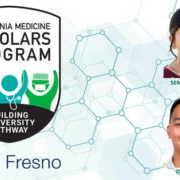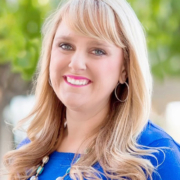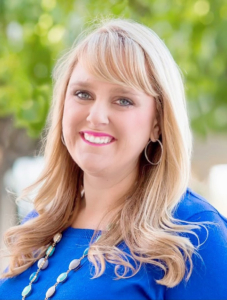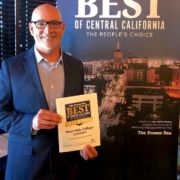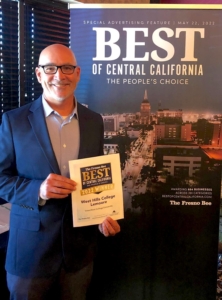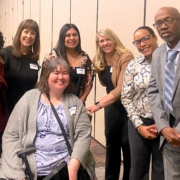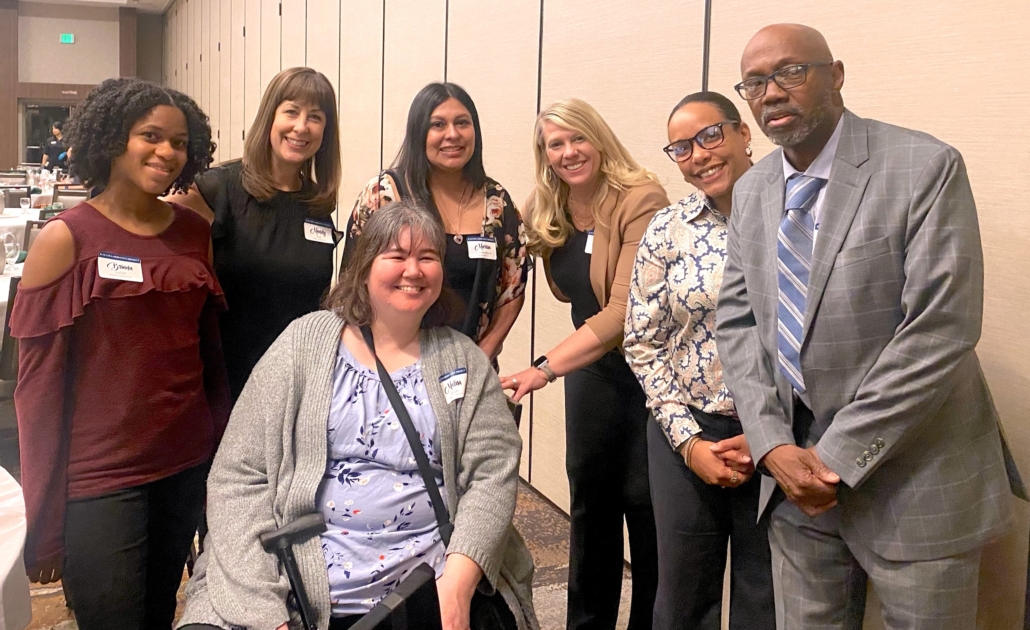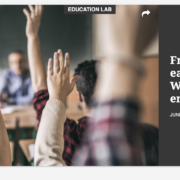BY ASHLEIGH PANOO
The Fresno Bee Ed Lab
(JUNE 12, 2022) — By this summer, over 100 high school teachers will be eligible to teach dual enrollment courses across California’s central San Jaoquin Valley, thanks to a two- year pilot program aimed at creating equity between rural and urban schools.
The Upskilling Teachers’ Master’s Program Pathway started in the Fresno area and is funded by a little over $1.5 million from the Fresno-Madera K-16 Collaborative, paying for high school teachers to earn their master’s degrees to teach college classes at their campuses.
Three cohorts have gone through the program, with the first beginning in January 2021 and the last finishing up this June. Fifty-six math and 61 English teachers will have earned their master’s degrees.
The teachers are spread out across the Valley, in Fresno, Madera, Tulare, Kings, Merced, and Kern counties. Fresno Unified sent the most teachers into the program with 71, Clovis sent 24, Central, four, and Sanger, eight.
Teachers chose from either a streamlined master’s in English from National University or in math from Fresno Pacific University.
The offerings of English and math for the pilot program were intentional, said John Spevak, a former Merced College vice president. He now serves as a regional lead for the Central Valley Higher Education Consortium. The goal is for the master’s program students to teach college-level math and English at their schools.
“Oftentimes, the biggest hurdle for (high school) students advancing is to have their college-level English and math courses completed,” he told the Education Lab.
That issue spurred legislation such as AB 705 and 1705, which have cut remedial courses at colleges by placing students straight into college-level math and English to speed up their time to get a degree.
Spevak said getting those out of the way could pave an easier way through college.
“Oftentimes, those are the two biggest stumbling blocks for a young person to succeed in college anyway,” he said.
WHAT IS DUAL ENROLLMENT?
When a high school student takes a dual enrollment course, they earn community college credit upon passing, the same as if they had taken the actual course in college. Some students have taken enough to earn an associate degree by the time they graduate high school.
The central San Joaquin Valley is one of the largest regions in the state with the fewest number of college graduates, according to the U.S. Census Bureau. On average, adults with higher levels of educational attainment have higher annual earnings than those who never graduated from high school or went to college.
According to a recent Public Policy Institute of California report, dual enrollment has been steadily increasing throughout the state. More than 112,000 high school students from the class of 2020 had taken at least one class. That’s an increase of 54% from the 2015-2016 year, the report found.
Several studies point to dual enrollment as beneficial for students, helping them maintain high GPAs and enter and stay in college. Researchers have found dual enrollment especially benefits students from low socio-economic households, although the benefits may be weaker for those from affluent backgrounds.
Yet, there are racial and ethnic disparities, the PPIC report found. Although first- generation students tend to enroll in slightly more courses and earn more transferable units, Black and Latino students who take dual enrollment courses complete fewer transferable courses and have a lower GPA than white and Asian students.
Education leaders in the Valley realized that the most significant equity gap for dual enrollment lies between rural and urban schools, according to Ben Duran, executive director of Central Valley Higher Education Consortium.
“Dual enrollment is a way of creating equity, if you will, across the board,” Duran said.
“It allows a kid in a little tiny high school 30 miles from Fresno to be able to take the same courses as a kid from Bullard High School … because they can take it oftentimes on their own campuses.”
Schools understand there are benefits to offering college courses to their students, so there’s one problem the Master’s Upskilling Program seeks to solve: There aren’t enough qualified instructors to teach dual enrollment.
Rural schools especially often lack such opportunities.
Most working high school teachers don’t have a master’s degree, according to statistics from the California Department of Education. But rural school districts with large shares of English language learners and/or low-income students are the least likely to have teachers who have master’s degrees, at 32%. Urban districts are the most likely, at 48%.
To teach a college class, a person must have a master’s degree. That’s been the rule in California for more than 30 years.
It’s also tough to get college instructors out into rural areas, Spevak said. Instructors may not want to commute long distances or work on a high school schedule, according to the PPIC report.
“Principals and superintendents were telling us, ‘We’d love to do this, but we don’t have anybody on our staff with a master’s degree, and it’s hard for the college to send folks out here,’” Spevak said.
LIMITATIONS TO UPSKILLING PROGRAM
Most of the teachers have so far come from the largest urban schools. Many rural schools, such as Fowler, Washington Union, and Yosemite Unified, have only one teacher each in the program, although those schools do have smaller populations.
A larger limitation to the program’s goal is that no one can actually make the teachers teach dual enrollment when they’re done with the program. They can only hope they will, according to Spevak.
“There’s no way we could require that,” he said.
”There’s no guarantee that you will be hired because the college has to hire you as an adjunct instructor as well as you being a high school teacher. We didn’t want to tie the hands of the college or the high school teacher.”
Instead, they only ask graduates if they will consider teaching dual enrollment at their high school. Graduates will be paired with mentors who can lead them through the process of applying to teach through the State Center Community College District.
The first cohort wrapped up in December 2021, and none have begun teaching dual enrollment yet, according to Spevak, but as only one semester has passed, it’s likely too early for any of them to have started.
NATIONAL UNIVERSITY AND FPU
Spevak said National University and Fresno Pacific University were chosen because they offered the most direct path to graduation and could be accomplished within a year to a year and a half.
The program can be replicated in other places, but organizations should make sure the curriculum is a good fit for students’ goals, according to program director Christine Photinos, who taught several classes for the cohorts at National University.
“Many graduate English programs still focus primarily on literary studies, even though students who complete (this) program will in most cases be teaching primarily writing, or teaching across multiple English studies sub-fields, not just literature,” she said.
“If (students) are not seeing connections between their graduate studies and their primary professional commitments, persistence in the program is going to be a challenge.”
She said although the core requirements were the same as for the regular master’s program, some classes had to be streamlined for the cohort of students to stay together.
“For example, one of the literary studies requirements is a course on a single author,” she said. “Well… which author?”
“We ended up developing a course in which each student could choose their own author of focus—but within the context of a common content centered on the study of textual strategies.”
Getting teachers to commit to the big undertaking of earning a master’s degree while working is also an obstacle.
“These folks are teachers by day and students by night,” she told the Education Lab, and on top of it all, they have many other commitments, both professional and personal.”
K-16 COLLABORATIVE ON GOVERNOR’S RADAR
The funding for the program came from Gov. Gavin Newsom’s office in 2020 and helped cover virtually all costs associated with earning a master’s degree, according to Fresno-Madera K-16 Collaborative director Kari Hammerstrom.
The grant funding has paid for whatever scholarships, discounts, or incentives don’t cover, leaving “little to no money out-of-pocket” for teachers to pay,” she said. Even books are sometimes covered.
Newsom’s office has been keeping regional collaboratives on the radar as the organizations aim to create partnerships between school districts and colleges to create pathways for students to earn degrees.
And Newsom just granted another $18.1 million to the Fresno-Madera and Tulare Kings Collaborative to use on projects such as expanding the master’s upskilling program.
“We have lots of positive feedback,” Hammerstrom said, “for an opportunity for a master’s program for teachers in ethnic studies, psychology, or some of the other A through G classes that could be taught in a dual enrollment capacity.”
See:
Fresno Bee EdLab story (June 12, 2022).
Fresno Bee video (June 12, 2022).
KGO Radio Podcast (June 15, 2022).
For CVHEC media inquiries: Tom Uribes – cvheccommunications@mail.fresnostate.edu (or text 559.348.3278).


